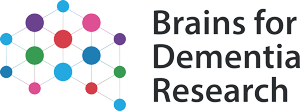About Brains for Dementia Research
There are 850,000 people living with dementia in the UK today and this figure is set to double in the next 30 years. Dementia has a huge impact on a person’s life and is one of society’s most urgent health and social care challenges. Despite this, treatment for dementia is very limited and there is no cure.

Human tissue is vital for dementia research but in the past was in short supply and is not covered in standard organ donation schemes. With the support of Alzheimer’s Society and Alzheimer’s Research UK, Brains for Dementia Research was set up in 2007 to establish a network of brain bank facilities across England and Wales.
It is now a ‘gold standard’ for brain tissue banking, linking five leading brain banks (based in London, Oxford, Newcastle, Bristol and Manchester) and a research centre in Cardiff in a network of common standards, best practice and cooperation. This lays the foundation to enable the highest quality dementia research, which aims to find effective treatments for dementia.
In each centre, people with mild cognitive impairment or a diagnosis of dementia, and healthy participants, are supported to register for brain donation by specialist research nurses.
This is a unique initiative, as the memory, thinking and behaviour of each prospective donor are monitored throughout their later life through regular assessments. This means that when the time comes for the donation to be made, researchers also have a detailed medical history and can see how brain changes correlate with symptoms.
Since we began in 2007, 3,278 people have signed up to donate their brain, and the brain banks are now no longer looking for more people to sign up through the Brains for Dementia Research scheme. Some of the brain banks may be able to register new donors separate to Brains for Dementia Research, depending on where you live. To find out where your nearest brain bank is, please visit the Uk brain banks network database where you can find out the contact details.

